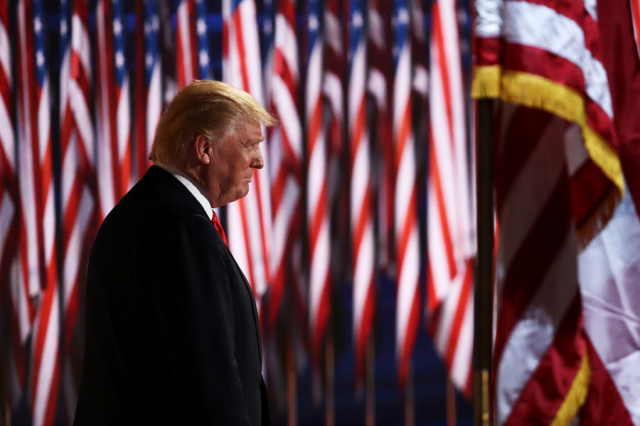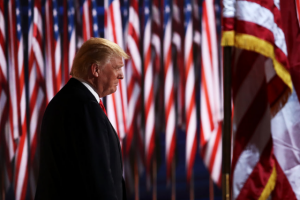Trump’s Election Leaves Europe's Emerging Nations On Edge
The 2016 presidential election in the United States will be seen as a watershed moment in political history.
For the first time in its history, the world’s oldest constitutional democracy elected a right wing, former reality TV populist as its president.
Amidst all the hand wringing by supporters of former Secretary of State Hillary Clinton over Trump’s record of misogyny, sexism, racism, anti-Semitism, Islamophobia and affinity for authoritarian leaders, real questions will now emerge about what kind of effect Donald Trump’s victory has for US foreign policy.
Trump spent little time during his 16-month bid for the Oval Office talking about the specifics of his administration’s foreign policy.
None of his surrogates or Trump himself offered any hint of how he would handle many of the world’s more troublesome hot spots – including the Caucasus.
Trump often made outlandish, bellicose statements about how he would launch crippling attacks against ISIS, dismember the NATO military alliance and arm Japan and South Korea with nuclear weapons.
When hard evidence emerged that top members of Trump’s campaign team had close ties to Viktor Yanukovych, the ousted pro-Russian former president of Ukraine, it strengthened the conventional wisdom that Trump and many of his inner circle harbor warm feelings towards the Kremlin and Russian President Vladimir Putin, whom Trump has publicly praised on many occasions.
It’s widely known that Trump’s top military advisors – Vice President-elect Mike Pence and former General Mike Flynn – believe that both Russia and the US have specific spheres of influence and have openly critiziced NATO for expanding into countries once part of the Soviet-led Warsaw Pact.
Both men, Flynn in particular, have faced strong rebukes from other fellow high-ranking officers in the military and the intelligence community for what many perceive as the two being overly complimentary to Putin and dismissive of Russia’s revanchist foreign policy over the last two years.
While the world can only speculate how President Trump will formulate his various strategies towards dealing with the world, one can assume that it will be markedly different from outgoing President Barack Obama’s view that American national interests are best served by working with a multipolar, globalized world.
Trump’s campaign statements and the inner circle around him have frequently voiced opinions that appear to be aimed at dismantling decades-old alliances and ripping up trade deals that are the engines of the world’s economy.
The overall net effect on developing countries like Georgia, Moldova and Ukraine –all of whom have spent years trying to incorporate into the West by making moves to later join the European Union and NATO – will become a major question and point of deep anxiety in Tbilisi, Kyiv and Kishinev.
Flynn, who is likely to be tapped as Trump’s National Security Advisor and who was sacked by Obama in 2014 as head of the Defense Intelligence Agency (DIA) over his management style and conflicts with the White House over his insistence that the DIA focus on radical Islamic terrorism instead of the threat of Russian aggression following Moscow’s invasion of Ukraine.
In an interview with the Washington Post, Flynn described himself as "not at all hostile to Russia," and was later described by Vox magazine as “having an open affection for Russia and its authoritarian government."
Flynn has been a regular guest analyst on the Kremlin’s state-controlled mouthpiece RT (formerly Russia Today) where he frequently criticizes the ongoing existence of NATO and the West’s support for Ukraine’s democratic ambitions.
At a 2015 gala dinner in Moscow in honor of RT’s 10th anniversary, Flynn was seated next to Putin.
His actions since leaving the military are seen by many of his former fellow soldiers as nothing less than traitorous.
“Flynn’s flirtations with Russia and Putin are a disgrace to the army and to his country,” a former army officer and Afghan War vet said in a conversation just days before the election.
Trump’s inexperience, lack of knowledge and general disinterest in foreign policy will likely lead to a larger hand-on roll for the incoming national security advisor.
Trump’s own hostility towards grassroots democratic movements – he’s frequently referred to the pro-democracy revolutions in Ukraine, Georgia and Hong Kong, as well as the 1989 Tiananmen Square massacre – as ‘riots’, ‘run by hooligans’.
Coupled with Flynn’s admitted admiration for the Kremlin’s view that the world is divided into two halves, the Western oriented future for Georgia, Ukraine and other post-Soviet countries will come under threat.
The governments in Tbilisi and Kyiv should not expect strong support over from the White House in the next four years, chiefly because the incoming administration does not view the former Soviet space as being anywhere near the top of their foreign policy agenda.
A key appointment in Trump’s incoming cabinet could come in the form of John Bolton, whom many believe will be the next Secretary of State.
Bolton was former President George W. Bush’s ambassador to the UN – though he was and remains a staunch opponent of the United Nations – and a key player in Bush’s inner circle of “neo-conservatives;” the chief architects of Bush’s Iraq War policy.
Bolton’s bellicose style matches that of Trump’s and Flynn’s. His penchant for dressing down ranking officials in public has endeared him to Trump, as it closely resembles Trump’s own character on the reality TV show he once stared in.
Bolton’s appointment will undoubtedly signal a far more combative and less cooperative tone from Washington.
Trump, Flynn and Pence have all gone on record saying they are open to the possibility of ending economic sanctions against Russia for its invasion of Ukraine and formally recognizing Moscow’s annexation of Crimea – a move that would be a cataclysmic rupture in the West’s coordinated efforts to stop Putin from taking similar actions in the Baltics and Eastern Europe.
A heightened sense of anxiety will emerge in Tbilisi and Kishinev, where the Georgian and Moldovan governments are dealing with their own Russian-occupied breakaway regions.
The sense from officials in both countries is that if the Trump administration is willing to hand over a vitally strategic region like Crimea to Putin, the current statuses of Abkhazia, South Ossetia and Transnistria will certainly be put on the table by Moscow.
Trump’s virulent hostility towards Western institutions including the EU and NATO, his maniacal obsession with beginning a trade war with China and his ability to alienate every Muslim country on Earth through his own bigotry and neo-Fascist diatribes will, once again, call into question the morality of the United States’ actions around the world.
It will most certainly usher in a far more unilateral American foreign policy initiative over the next four years.
Georgia, Moldova and Ukraine, countries that find themselves outside of the narrow worldview of the new Trump administration, will then be forced to go it alone until at least 2020.
Nicholas Waller












